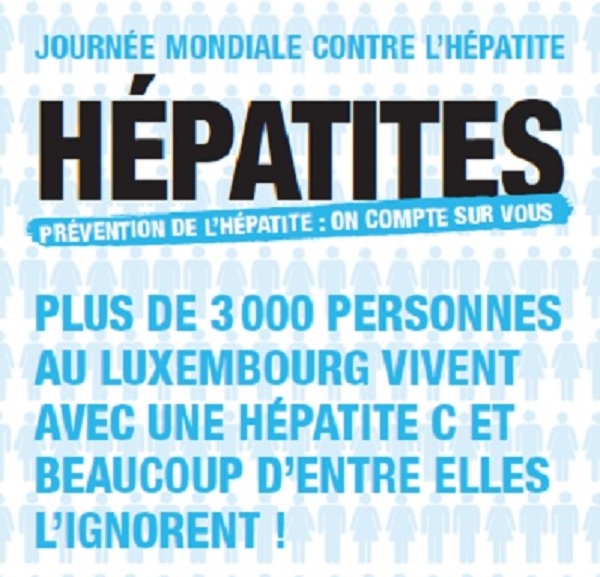
Luxembourg’s Ministry of Health has announced that on Thursday 28 July 2016, targeted activities to educate the public about the risk posed by hepatitis, and the importance of taking prescribed treatments for infections, will take place in Luxembourg on the occasion of the World Hepatitis Day 2016.
The Ministry of Health, in collaboration with the Luxembourg Institute of Health and HIV Berodung of the Luxembourg Red Cross, invites everyone to its information booth to be installed in the forecourt of Luxembourg-Gare from 15:00 until 18:00. By-passers can inform themselves about hepatitis, and also get tested.
Condoms and flyers to highlight the importance of prevention and early detection will also be distributed. In addition to this, experts will be present to answer any questions relating to hepatitis. The DIMPS (Dispositif d’intervention mobile pour la promotion de la santé sexuelle) will also be on site and will provide quick, free and anonymous testing.
Some activities will also be offered, including graffiti workshops, smoothie tasting to refuel vitamins A, B and C, and a quiz about hepatitis.
The World Hepatitis Day is one of four official world days initiated by the World Health Organization (WHO). This is an opportunity to intensify national and international efforts against this disease. In addition, partners and Member States are invited to support the first global strategy in the health sector against viral hepatitis, launched at the World Health Assembly in May 2016, covering the period 2016-2021.
This new strategy sets the following targets: a 30% reduction in the number of new cases of hepatitis B and hepatitis C, and a 10% reduction in mortality by 2020.
The proposed strategies include expanding vaccination programmes against hepatitis B; to focus on the prevention of mother to child transmission of hepatitis B; to improve the safety of injections, transfusions and surgical procedures; organise "harm reduction" services for people who inject drugs, and to improve access to diagnosis and treatment of hepatitis B and hepatitis C.
Viral hepatitis is a group of infectious diseases caused by viruses. There are five types: A, B, C, D and E. It currently affects 400 million people worldwide, and causes acute and chronic liver disease. Given the scale of the epidemic, anyone can be at risk.
Hepatitis kills nearly 1.4 million people per year, especially hepatitis B and hepatitis C. It is estimated that 95% of people with chronic hepatitis are unaware of their infection.
The test is free, anonymous, and you do not need a prescription, at the Laboratoire national de santé (LNS), CHL, CHEM and at CHdN (Ettelbruck).
The HIV Berodung of the Luxembourg Red Cross (the specialised service for the accompaniment, monitoring and counseling of people affected by hepatitis, STIs and HIV) and DIMPS also offer rapid tests for free and anonymous screening throughout the year. DIMPS locations and visit times are available on the www.dimps.lu website.
Ignoring one’s condition or the difficulty of access to health care services explain that most people who need treatment do not actually receive treatment. Less than 1% globally have access to treatment.
The appropriate treatment of hepatitis B and hepatitis C can prevent the onset of major life-threatening chronic diseases such as cirrhosis and liver cancer.
Officials can currently completely cure over 90% of people with hepatitis C in 3 to 6 months. The WHO has also pointed out that by increasing treatment, it could save 7 million lives between 2015 and 2030, with positive economic impacts for communities.
In Luxembourg, 3,150 people are infected with hepatitis C, and there is currently no vaccine against it. Researchers from the Luxembourg Institute of Health (LIH) lead, in partnership with the Centre Hospitalier de Luxembourg (CHL) research to better understand and control the disease. If treatments exist, they do not always prove effective and cases of resistance have been observed. It is imperative to study these cases, according to the LIH. This is what the team of Dr. Carole Devaux of the Infectious Diseases Research Unit and the Clinical and Epidemiological Investigation Center (CIEC) of LIH are looking into through two studies conducted in collaboration with Dr. Vic Arendt from the Service national des maladies infectieuses au Centre hospitalier de Luxembourg (CHL).
The first study, conducted among drug users, aims to better understand consumption patterns and associated risk factors, evaluate the effectiveness of new treatments and improve prevention efforts. This study is currently conducted at the Abrigado and CHL in collaboration with the HIV Berodung, and soon also at the Jugend an Drogenhëllef.
The second study is currently being conducted in two prisons in Luxembourg, and aims to achieve annual monitoring of patients in detention and to provide descriptive data (reinfection rates, risk factors, etc.) in order to better understand, treat or prevent hepatitis C.
A record listing the event of failures and resistance to new therapies against hepatitis C was established to contribute to the establishment of a European monitoring programme.








